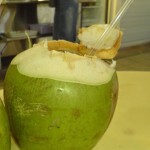New Celebrity Drink Fad: Coconut Water!

This year’s summer drink for health conscious celebrities seems to be coconut water. Celebs such as Madonna, Demi Moore, Kim Kardashian, Molly Sims, Heidi Klum and Brooke Shields have all be spotted sipping the beverage. Madonna has even invested in Vita Coca, one of the brands of the drink. It is estimated that the coconut water market is now at $50 million and climbing. Even Coke and Pepsi are trying to get into the market.
 So what is coconut water, and why are celebrities flocking to it?
So what is coconut water, and why are celebrities flocking to it?
Coconut water is the clear liquid inside young coconuts. As the fruit matures, the coconut water gradually is replaced by the coconut meat and air. Coconut water has been a popular drink in the tropics, where it has served fresh, canned or bottled for many years. There it’s been served with the outer husk of the coconut removed and a hole placed on top for access to the water. In this country, it is found packaged under the brand names O.N.E., VitaCoco, and ZICO.
Coconut water is isotonic, meaning it is a solution that has the same salt concentration as the normal cells of the body and the blood. During WWII in the Pacific, it was used by both sides -siphoned directly from the nut - to give emergency plasma transfusions to wounded soldiers. It is also being used in third world countries to help rehydrate patients with diarrhea. 10 years ago, the U.N.’s Food and Agriculture Organization (FAO) was granted a patent — the first ever given to a U.N. agency — for bottling coconut water in a way that preserves its nutrients.
Coconut water has no fat or cholesterol (it’s the coconut meat which develops later that has the fat), and is low in sugar (5 mg/100ml). It contains more potassium (at about 294 mg) than a banana, and most sports drinks (117 mg) and most energy drinks.It has about 25 mg of sodium and is high in chloride (about 120mg). It also contains small amounts of calcium, phosphorus and magnesium. Unfortunately, once exposed to air, the liquid rapidly loses most of its nutritional characteristics, and begins to ferment, so most manufacturers use a process called “flash pasteurization”. This protects the nutrition while keeping you safe from foreign substances.
Other than it’s ability to rehydrate (especially in life threatening situations in remote regions) there is little scientific study supporting some of the other health benefits proponents tout: from boosting your immune system, reducing menstrual cramps, dissolving kidney stones, and even decreasing the risk of cancer. I did read one anecdotal report that it works well for hangovers- probably because the rehydration effects of the coconut water counterbalance the diuretic effects of alcohol.
























1 Comment